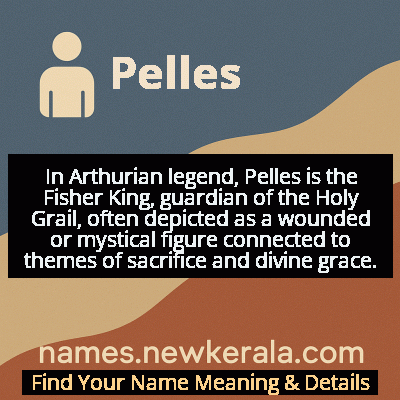Pelles Name Meaning & Details
Origin, Popularity, Numerology Analysis & Name Meaning of Pelles
Discover the origin, meaning, and cultural significance of the name PELLES. Delve into its historical roots and explore the lasting impact it has had on communities and traditions.
Name
Pelles
Gender
Male
Origin
Arthurian
Lucky Number
6
Meaning of the Name - Pelles
In Arthurian legend, Pelles is the Fisher King, guardian of the Holy Grail, often depicted as a wounded or mystical figure connected to themes of sacrifice and divine grace.
Pelles - Complete Numerology Analysis
Your Numerology Number
Based on Pythagorean Numerology System
Ruling Planet
Venus
Positive Nature
Harmonious, responsible, caring, and artistic.
Negative Traits
Overly idealistic, superficial, possessive, or jealous.
Lucky Colours
Pink, turquoise.
Lucky Days
Friday.
Lucky Stones
Diamond, turquoise.
Harmony Numbers
2, 3, 9.
Best Suited Professions
Artists, musicians, teachers, healthcare workers.
What People Like About You
Warmth, nurturing nature, artistic flair.
Famous People Named Pelles
King Pelles
Arthurian monarch
Guardian of the Holy Grail and father of Elaine of Corbenic
Pelles of Corbenic
Grail King
Keeper of the Grail Castle and central figure in Grail quest narratives
Pelles the Maimed King
Mythical ruler
Suffered a mystical wound that paralleled his kingdom's desolation
Name Variations & International Equivalents
Click on blue names to explore their detailed meanings. Gray names with will be available soon.
Cultural & Historical Significance
The character's importance extends through his genealogical connections - as the father of Elaine of Corbenic and grandfather of Galahad, Pelles becomes the human vessel through which the perfect Grail knight enters the world. His orchestration of Lancelot's encounter with Elaine, resulting in Galahad's conception, demonstrates his understanding of and participation in divine prophecy. Pelles embodies the transition from the old, wounded order to the new, redeemed order that Galahad represents. His eventual healing through Galahad's Grail achievements completes his symbolic journey from suffering guardian to redeemed participant in divine grace, making him a central figure in the Arthurian world's spiritual transformation.
Extended Personality Analysis
Pelles exhibits a multifaceted personality defined by his dual roles as suffering monarch and spiritual guardian. His most prominent trait is enduring patience - he bears his mysterious wound with remarkable fortitude, understanding that his healing awaits the destined Grail knight. This demonstrates profound spiritual maturity and acceptance of divine timing. As Grail guardian, Pelles possesses deep mystical insight and wisdom, having been entrusted with Christianity's most sacred relic. His knowledge extends to prophecy and destiny, shown through his careful orchestration of events leading to Galahad's birth.
Despite his suffering, Pelles maintains a nurturing and paternal aspect, particularly in his relationship with his daughter Elaine. He shows strategic intelligence in understanding how to work within prophetic frameworks to ensure their fulfillment. His character balances earthly authority with spiritual humility - he rules as king yet submits completely to the higher purpose of Grail guardianship. Pelles embodies the paradox of being both powerful and vulnerable, authoritative and surrendered. His personality represents the integration of human limitation with spiritual purpose, making him a model of how suffering, when embraced with faith and understanding, can become a path to profound wisdom and eventual redemption.
Modern Usage & Popularity
In contemporary times, the name Pelles remains exceptionally rare and maintains strong associations with its Arthurian origins. Its usage is primarily confined to literary enthusiasts, Arthurian scholars, and parents seeking distinctive mythological names with deep spiritual resonance. The name has never appeared on popular baby name charts, preserving its unique character and ensuring that bearers maintain a strong connection to medieval literature and Grail mythology. Modern usage occasionally extends to fantasy literature, role-playing games, and Arthurian-themed media, where it serves as an immediate reference to the Fisher King archetype. The name's continued obscurity means that those named Pelles typically come from families with particular interest in Celtic mythology, Christian mysticism, or medieval studies. Its masculine gender association remains consistent with its literary origins, and the name carries an air of scholarly distinction and mystical depth that appeals to those seeking names with profound historical and symbolic weight.
Symbolic & Spiritual Meanings
The name Peles carries rich symbolic meanings rooted in its Arthurian context as the Fisher King. Primarily, it represents the wounded healer archetype - the idea that through one's own suffering and vulnerability, one can facilitate healing and wisdom for others. The fishing imagery connects to biblical symbolism of being 'fishers of men,' suggesting the drawing of spiritual truths from mysterious depths. Peles symbolizes the intimate connection between ruler and realm, where the monarch's physical and spiritual condition directly affects the land's fertility and prosperity.
As Grail guardian, Peles embodies the concept of stewardship - caring for sacred mysteries until the destined individual appears to fully comprehend them. His character represents the intersection of human agency and divine will, demonstrating how individuals participate in larger spiritual narratives. The name also carries themes of paternal destiny and genealogical importance, as Peles' lineage produces the perfect knight Galahad. His eventual healing through the Grail quest symbolizes redemption through surrender to higher purposes and the transformative power of divine grace. Ultimately, Peles represents the journey from wounded limitation to redeemed participation in spiritual mysteries, making his name a powerful symbol of hope, patience, and the ultimate triumph of spiritual purpose over physical suffering.

